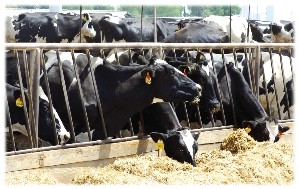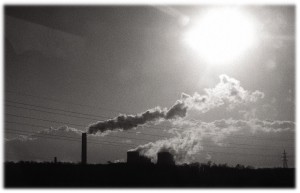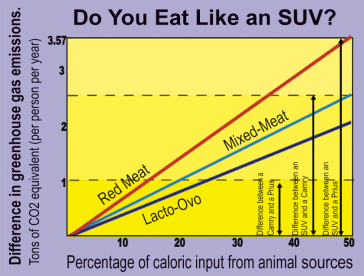|
|
|
Vegetarian Diet,
By USA News Group (Originally in English) |
There are numerous ways that are commonly known to reduce carbon dioxide emissions: reducing fossil fuel usage; engaging in renewable energies such as solar or wind power; reducing, reusing and recycling everyday items; driving a fuel-efficient or alternative energy car; using energy-saving electronics, and others. Yet the most powerful way to stop global warming is to adopt a vegetarian diet!
In a press conference on January 15, held by the Intergovernmental Panel on Climate Change (IPCC), the head of the IPCC, Dr. Pachuari warned that if the human race doesn’t act now, “climate change will have serious impacts.” He also clearly stated that the way to halt climate change is to stop eating meat, and make a change to a greener lifestyle.
The United Nations’ report on livestock and the environment published in 2006 revealed that, “The livestock sector emerges as one of the top two or three most significant contributors to the most serious environmental crisis, at every scale from local to global.” Almost a fifth (20 percent) of carbon emissions come from livestock - that’s more emissions than from all of the world’s transportation combined!
 |
Industrialized animal-based agriculture is “astonishingly” the main cause of environmental destruction and greenhouse gas emissions.
Raising animals for food is one of the largest sources of carbon dioxide and the single largest source of both methane and nitrous oxide emissions. The livestock sector accounts for 9 percent of carbon dioxide, 65 percent of nitrous oxide and 37 percent of methane produced from human-related activities. Both methane (20 times) and nitrous oxide (296 times) are considerably more potent greenhouse gases than carbon dioxide. Livestock also generates 64 percent of human-related ammonia, which contributes to acid rain.
 |
It is also a major source of land and water damage and pollution. Livestock currently use 30 percent of the Earth’s land surface, and even more land and water is used to grow the feed for livestock. According to Mr. Steinfeld, the senior author of the Food and Agriculture Organization report, Livestock’s Long Shadow–Environmental Issues and Options, livestock is the “major driver of deforestation … some 70 percent of former forests in the Amazon have been turned over to grazing.” In addition, animal-based agriculture causes land degradation. About 20 percent of pastures are degraded through overgrazing, compaction and erosion. It is also responsible for vast water consumption and pollution. In the USA alone, trillions of gallons of irrigation water is used to grow crops to feed animals annually. This is about 85 percent of the USA’s fresh water resources. Animals also generate excessive amounts of biological waste for the ecosystem to take.
Water
consumption in generating one kilo of food in US
animal-based agriculture
|
1 kg of meat |
Water (liter) |
|
Beef |
1,000,000 |
|
Chicken |
3,500 |
|
Soybean |
2,000 |
|
Rice |
1,912 |
|
Wheat |
900 |
|
Potato |
500 |
Besides the damages to the environment and ecosystem, it is not hard to calculate that animal-based agriculture is the least energy-efficient practice; it takes enormous energy to convert livestock to meat on people’s dining table. Producing one kilogram of meat causes carbon dioxide emissions equivalent to 36.4 kilos. It is calculated that to produce one calorie of protein takes only two calories of fossil fuel for soybean, three calories for corn and wheat, but it takes 54 calories of petroleum energy for beef protein!
It means it takes 27 times as much fossil fuel energy to make a hamburger as it takes to make a soy burger!
In combination of energy cost, water consumption, land usage, environmental pollution, ecosystem disruption, it is not surprising to learn that one meat-based diet could feed 15 plant-based diets or more.
Last year, researchers from the Department of Geophysical Sciences at the University of Chicago, Gidon Eshel and Pamela Martin, also disclosed the connections between food production and environmental problems. They quantified the greenhouse gas consequences of red meat, fish, poultry, milk and eggs, and compared those numbers to a vegan diet. They found that switching from the standard American diet to a plant-based diet could result in preventing an extra ton and a half of greenhouse emissions per person per year. By contrast, switching from a standard sedan like a Toyota Camry to a hybrid Toyota Prius saves about one ton of CO2 emissions.
|
 |
The choice is right in your kitchen:
Even if one chooses to close their eyes to the ethical cruelty in animal-based
agriculture, the urgency of stopping climate change and how to do it is
clear. And it’s not just the vegetarians or environmentalists who
are saying it; now the head of an
international body, Dr. Pachauri, has announced to the world that the
effects of meat-eating are detrimental to our planet and that we should
stop eating meat in order to turn things around. Yet it comes down to
people’s choice. We’re all responsible for a cooler, cleaner
and healthier Earth. So simply start in your kitchen: choose a vegetarian
diet and help reverse climate change. ![]()
Reference:
http://www.huffingtonpost.com/kathy-freston/vegetarian-is-the-new-pri_b_39014.html
http://www.goveg.com/environment-globalwarming.asp
http://www.satyamag.com/feb07/eshel.html
Dr. Will Turtle: The world peace diet chapter 11 and the references used therein
http://afp.google.com/article/ALeqM5iIVBkZpOUA9Hz3Xc2u-61mDlrw0Q
http://www.un.org/apps/news/story.asp?NewsID=20772&Cr=global&Cr1=warming
http://www.news.cornell.edu/releases/Aug97/livestock.hrs.html
| << | Contents | >> |
|
Refer this page to friends
|
||